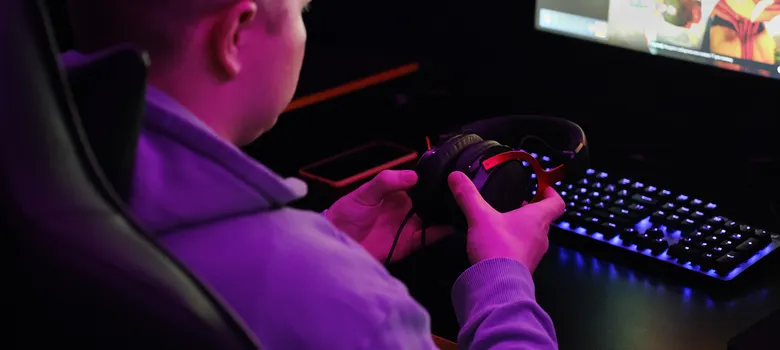
The most important behavioural signs of gaming addiction include spending more time gaming than on other activities, ignoring daily responsibilities, and feeling irritable or anxious when unable to play. You may also notice yourself withdrawing from friends and family, or missing work and school, as gaming consumes most of your time.
Gaming addiction can affect your mood, academic or work performance, and relationships. It is helpful to recognise these warning signs early, as they can impact your mental health and daily functioning.
Core Behavioural Signs of Gaming Addiction
Gaming addiction shows consistent patterns in how a person behaves and copes with everyday life. These signs can interfere with well-being, family dynamics, and professional or academic responsibilities.
Compulsive Gaming Patterns
One of the most prominent behavioural signs of gaming addiction is compulsive gaming. You may find it challenging to stop or limit your game time, even when you are aware of its negative consequences. This loss of control over gaming habits is often a key indicator.
Common compulsive patterns include:
- Trying to cut down on game use but failing
- Feeling low or agitated when unable to play video games
- Skipping meals, sleep, or social time to continue gaming
These behaviours reflect what specialists describe as impaired control over gaming. It becomes increasingly difficult to prioritise anything else, as gaming may dominate your thoughts and schedule.
Neglect of Personal Responsibilities
Addiction to video games can cause individuals to neglect their daily responsibilities. Schoolwork, job duties, and even basic hygiene are often sidelined due to gaming.
Warning signs include:
- Frequently missing appointments or deadlines
- Declining academic or work performance
- Skipping meals or neglecting personal care
The extent to which gaming takes precedence over everyday tasks reflects how behavioural addiction can interfere with practical life demands.
Loss of Interest in Other Activities
Another common symptom of video game addiction is losing interest in activities once enjoyed. This withdrawal from hobbies, sports, and social interactions is often a red flag. You might find yourself stopping contact with friends or skipping events you previously enjoyed.
Activities that used to bring joy, such as music, art, or sports, may start to feel dull in comparison to gaming. If online gaming feels more rewarding than anything else, or you often prioritise playing the next game over previously scheduled plans, this could indicate a deeper issue.

Signs and Symptoms of Video Game Addiction
Video game addiction is defined by a consistent pattern of gaming behaviour that leads to distress or impairment in daily life, which is also noted as Internet Gaming Disorder in the Diagnostic and Statistical Manual for Mental Disorders (DSM-5). People who play video games excessively may experience a range of signs and symptoms, both psychological and physical.
Common signs of video game addiction include preoccupation with gaming, reduced interest in other activities, gaming despite knowing the harm it causes, and using video games as an emotional escape. These addiction symptoms often reflect an increasing priority given to gaming over responsibilities, relationships, or health.
The condition can include gaming that continues for hours without breaks, disruption of sleep and eating patterns, and a deterioration in academic or work performance. These symptoms of IGD can develop gradually and are often overlooked until the behaviour becomes deeply entrenched.
Cause of Video Game Addiction
The cause of video game addiction is not limited to a single factor. Instead, it involves a combination of biological, psychological, and environmental influences. One key risk factor is the way video games may trigger the brain’s reward system, particularly through the release of dopamine during wins or achievements. Over time, this repeated stimulation can change neural pathways, making the behaviour more compulsive.
Research on video game addiction suggests that certain personality traits may increase vulnerability. People experiencing a mental health condition like depression or ADHD may also use gaming as a coping mechanism, especially when support systems are lacking. Other contributors include stress, poor emotion regulation, and a lack of offline social connection.
A common pattern of gaming behaviour seen in those diagnosed with video game addiction is the continuation or escalation of gaming despite harmful consequences. For some, the use of the internet and video gaming becomes a substitute for real-life interaction or achievement. The addictive cycle is reinforced by game design features that encourage prolonged engagement.
Emotional and Social Symptoms
Gaming addiction affects not just how you behave, but also how you feel and relate to others. Emotional and social symptoms are often the most visible to family and friends.
Irritability or Agitation When Not Gaming
Feelings of anger or restlessness when gaming is interrupted are common signs of internet and video game addiction. These mood shifts can seem extreme or out of character.
You might react angrily to being asked to stop gaming, struggle to focus on non-gaming activities, or become easily frustrated or anxious when not playing. These withdrawal symptoms can create conflict at home or school, especially if others avoid engaging with you to prevent negative reactions.
Withdrawal from Relationships
As video games or online gaming take up more time, you may notice growing distance from loved ones. This social isolation is a behavioural sign of gaming addiction that can develop gradually.
You may turn down invitations to spend time gaming, show less interest in conversation, or feel less inclined to share or engage with others in person. Over time, you may rely increasingly on online communities for social connection, which can make real-world relationships feel secondary or burdensome.
Mood Swings Related to Gaming
Your mood may begin to reflect what happens in-game. Wins can bring elation, while setbacks lead to frustration or sadness. This emotional dependency can contribute to broader mental health issues.
You might feel low or irritable for hours after a gaming loss or experience a noticeable rush of dopamine after in-game success. When non-gaming activities no longer provide satisfaction and gaming becomes the only reliable source of positive emotion, it can significantly impact your emotional resilience and overall well-being.

Physical and Cognitive Indicators
Excessive gaming often leads to noticeable changes in sleep, cognition, and physical health. Recognising these signs early can help prevent more serious health impacts.
Changes in Sleep Patterns
Video game addiction may significantly affect your sleep. Individuals often stay up late or engage in all-night sessions, which can cause chronic fatigue and impaired concentration. You may have trouble sleeping without gaming first, feel groggy or poorly alert during the day, and find yourself missing early commitments due to gaming the night before. Sleep deprivation due to gaming can lower your immunity and heighten emotional instability, increasing your risk of burnout.
Decline in Academic or Work Performance
As game playing increases, academic and professional responsibilities may suffer. You might miss deadlines, appear disengaged, or submit subpar work. This decline could include falling behind in classes or work tasks, receiving poor grades or performance evaluations, or hearing negative feedback from teachers or supervisors. This drop in functioning is often a sign that gaming is interfering with cognitive and executive skills necessary for success.
Finding Support for Gaming and Substance Use at Sivana Bali
Behavioural addictions like gaming often overlap with substance use, making it crucial to approach recovery in a holistic way. Sivana Bali offers a setting where both issues can be addressed simultaneously, without judgement and with attention to each individual’s needs.
By combining professional care with a tranquil setting, they help clients re-establish control over their habits and find meaning beyond the screen or the substance. For those ready to make a change, this kind of comprehensive care can be a powerful first step.
Frequently Asked Questions
What are the common indicators that someone may be addicted to video games?
You might notice a growing preoccupation with gaming, difficulty stopping, and strong emotional reactions when unable to play. These are hallmark symptoms of gaming addiction.
What changes in social behaviour suggest a gaming addiction?
Avoiding friends, neglecting relationships, or replacing face-to-face interaction with online games may indicate internet gaming disorder in children or adults.
What physical symptoms often accompany excessive gaming?
Common physical health concerns include eye strain, back or wrist pain, fatigue, and reduced physical activity levels.
In what ways can video game addiction impact a person´s daily responsibilities?
Video game addiction can affect your ability to complete tasks, attend school or work, and maintain household routines.
How does sleep disruption relate to compulsive gaming habits?
Excessive video game use often leads to sleep disruption, which can impair mood and cognitive functioning.
Can mood swings be associated with addictive gaming activities?
Yes. Gaming addicts often experience emotional highs and lows tied to gaming outcomes. Irritability or sadness when gaming is taken away is also common.
